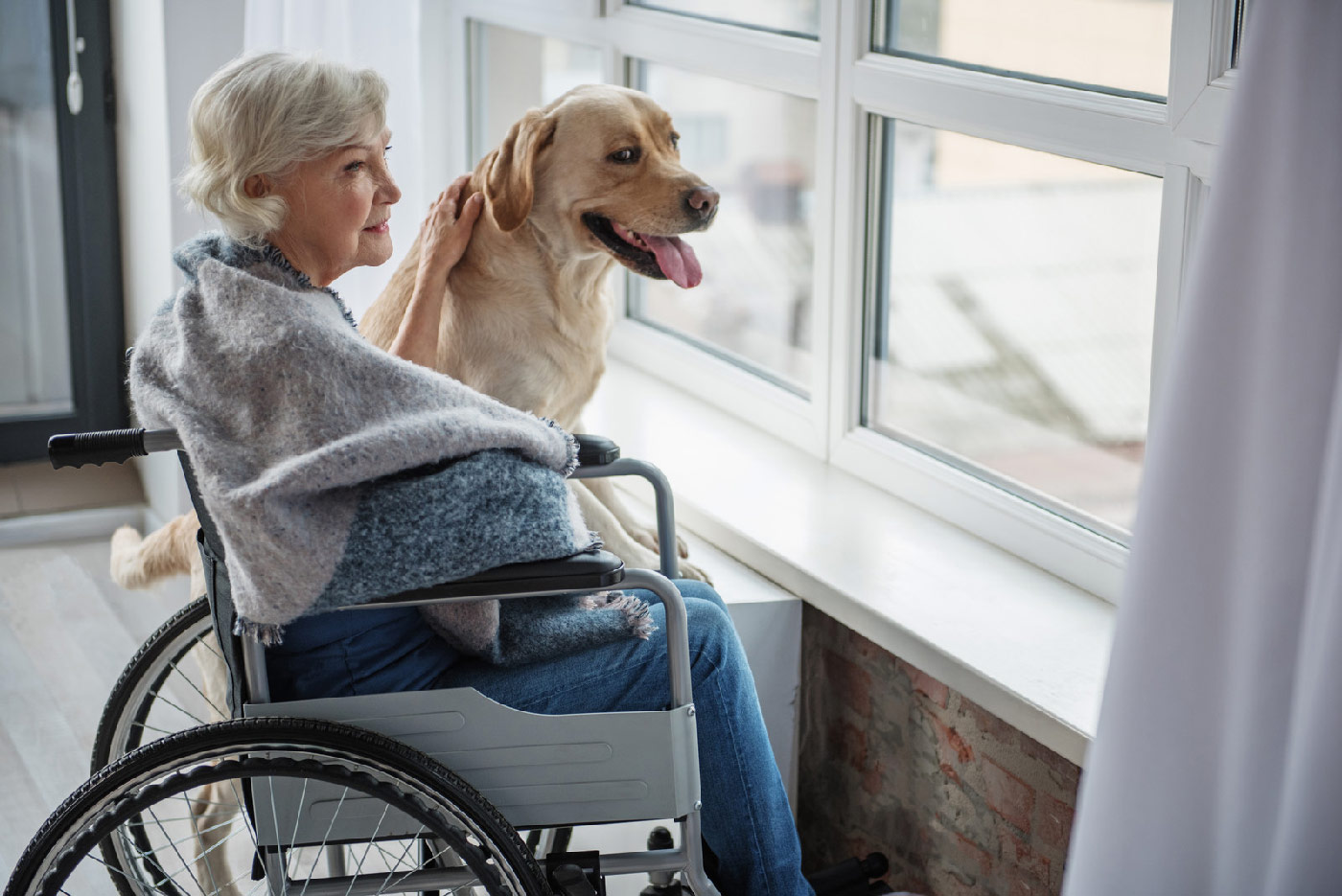For those with Alzheimer’s and Dementia, the world is a very different place. Their sensory acuity can be heightened toward music and toward everyday things that we don’t give another thought to. Working with seniors with Alzheimer’s, professionals are making breakthrough new ways to reach them. They are oftentimes in their own worlds, and these breakthroughs can make a significant impact.
 One of the most effective ways to touch the hearts of seniors with Alzheimer’s is through the touch of a therapy animal. Through our own program 12 Days of Goodness during the holidays, we feature Therapy Animals to visit seniors throughout Western Washington. The gift that they bring to lonely seniors over a very difficult time of year is such a beautiful thing. We have seen first-hand the magic that happens when a therapy animal meets a human being.
One of the most effective ways to touch the hearts of seniors with Alzheimer’s is through the touch of a therapy animal. Through our own program 12 Days of Goodness during the holidays, we feature Therapy Animals to visit seniors throughout Western Washington. The gift that they bring to lonely seniors over a very difficult time of year is such a beautiful thing. We have seen first-hand the magic that happens when a therapy animal meets a human being.
There are two ways specifically that therapy animals can help those with Alzheimer’s. For those individuals who are in the early stages, dogs are now being trained to become companions to those who are in the early stages of the disease. Unlike wearing a service vest, they actually walk on a regular leash with a specially designed collar that has a GPS unit on it. If a senior forgets their way home, or when they could get lost on a walk, the dog is especially trained to know the command “Home” and through their scent, they can lead a senior home. In addition, a family can check on their loved one’s location through an app that connects directly to the dog’s collar.
In addition, because dogs are routine oriented, the patient can rely on the dog’s training to lead him or her through a morning routine, and through tasks throughout the day, to help them stay hydrated, remind to take medications, and also, to help trigger an alarm if anything happens.
 Secondly, as the day is spent with someone with Alzheimer’s disease in skilled Memory Care, it’s often spent alone. Sadly, it’s common for families to not come around so much if a loved one is in more advanced stages of Alzheimer’s or Dementia. This can bring about Depression, which will in turn escalate the symptoms of Alzheimer’s. It can put the individual’s world into a very dark hole, sitting alone, and isolated for most of their days.
Secondly, as the day is spent with someone with Alzheimer’s disease in skilled Memory Care, it’s often spent alone. Sadly, it’s common for families to not come around so much if a loved one is in more advanced stages of Alzheimer’s or Dementia. This can bring about Depression, which will in turn escalate the symptoms of Alzheimer’s. It can put the individual’s world into a very dark hole, sitting alone, and isolated for most of their days.
Here in Western Washington sometimes the biggest hit is to have an animal that is unconventional — like a miniature pony.
Victoria Smith of Visiting Hooves spends every single day traveling to various Memory Care communities in Southwest Washington with her four therapy horses and bunnies. Vicki shared with me the reaction of seniors who might be in later stages of Alzheimer’s. Some of them get so excited to see her sweet ponies, who enter wearing tennis shoes. Other times, they are asleep in a chair when she arrives. “I will wake them up and say to them, Chicky is here! They are so delighted and will often times reach out to want to stroke her or pet her.” “Chicky” is Vicki’s #1 therapy pony out of who has been making visits consistently for years in memory care centers.
Vicki also brings her bunnies, who she lays out on a long table, and the residents will gather around them. In some communities, the bunnies are the overall favorite, and she makes sure that she brings them to visit a couple times per month.
 Sarah Kessler is well known among the 12s and owns “Wilson” the 12th Pony. For those who attend games or fan rallies, “Wilson” is well known, and we see him all dressed up in his green and blue! What fans may not know is that Wilson also is a therapy animal. He visits hospitals, schools, and also he is a favorite where we visit with Seahawks Legends to touch the hearts of seniors. While the Legends are visiting those who do not have memory impairments, Wilson will spend a considerable period of time making the rounds to visit seniors in Memory Care.
Sarah Kessler is well known among the 12s and owns “Wilson” the 12th Pony. For those who attend games or fan rallies, “Wilson” is well known, and we see him all dressed up in his green and blue! What fans may not know is that Wilson also is a therapy animal. He visits hospitals, schools, and also he is a favorite where we visit with Seahawks Legends to touch the hearts of seniors. While the Legends are visiting those who do not have memory impairments, Wilson will spend a considerable period of time making the rounds to visit seniors in Memory Care.
“One of my favorite stories of my experiences was visiting Madrona Park, a Memory Care center in Federal Way. Wilson and I had the opportunity to spend time with the seniors there. One of the women was blind — on top of having Alzheimer’s. I watched Wilson’s energy completely shift to match hers. It was incredible watching her respond to him, where the rest of us, she was unresponsive to.”
We all know that animals provide support, reassurance, companionship, and they bring us memories of those that we loved in our past. Thanks to so many who devote their lives to bringing joy to those with Alzheimer’s, we can look to the animals to do things with those who don’t necessarily respond to human interaction. They can be a constant companion, or a nurturing part of life.
For those who are interested in bringing therapy animals to your community, you can reach out to:
www.VisitingHooves.com or www.12thpony.com










